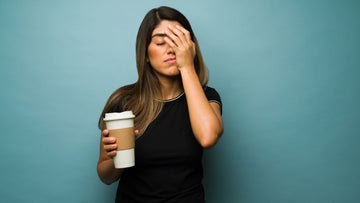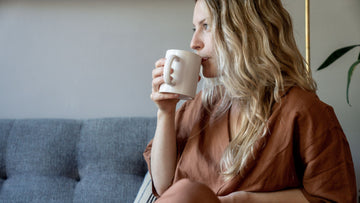
For many people trying to cut back on caffeine, decaf coffee feels like the perfect compromise. You still get to enjoy the familiar aroma, warmth, and comfort of your morning ritual — but supposedly without the caffeine jitters, crashes, or sleep problems.
But here’s the truth: decaf isn’t actually caffeine-free.
And for women who are sensitive to caffeine, or dealing with health issues like anxiety, hormonal imbalance, or thyroid conditions — that small amount of caffeine can still have a big impact.
Let’s dive into why “decaf” might not be the safe swap you think it is — and what to drink instead.
☕ What “Decaf” Really Means
The word decaf is short for decaffeinated, not non-caffeinated — and that difference matters.
Decaf coffee still contains caffeine — typically between 2 and 15 milligrams per cup, depending on the type of beans, roast, and method used to remove caffeine.
For comparison, a standard cup of regular coffee has about 80–120 mg.
So while it’s less caffeine, it’s not zero.
If you’re someone who’s been told to eliminate caffeine for medical reasons, even those few milligrams can make a difference.
According to the Mayo Clinic, “decaffeinated coffee isn’t caffeine-free. A cup of decaf can contain 2–15 mg of caffeine, depending on the brand and brewing method.” That’s enough to disrupt sleep cycles, increase heart rate, or trigger anxiety in sensitive individuals.
⚗️ How Decaf Is Made — and Why It Matters
There are several methods used to remove caffeine from coffee beans, but none remove it entirely.
1. Solvent-Based Methods
This is the most common process, where beans are soaked in a chemical solvent (like methylene chloride or ethyl acetate) to dissolve the caffeine.
While the beans are later rinsed, trace chemicals can remain — a red flag for those wanting a cleaner cup.
2. Swiss Water Process
This chemical-free method uses water and osmosis to remove caffeine. It’s safer and more natural, but still leaves around 3–5% caffeine in the final product.
3. CO₂ Process
Carbon dioxide under pressure extracts caffeine. It’s considered one of the cleanest methods, but it’s expensive, so not every brand uses it.
The key takeaway?
No decaffeination process can remove 100% of caffeine.
And some can introduce unwanted residues that might not align with your health goals.
💥 Why Even Small Amounts of Caffeine Can Affect You
If you’ve ever felt your heart race or your hands shake after “just one cup of decaf,” you’re not imagining it.
Even small doses of caffeine can:
-
Increase cortisol and adrenaline, your body’s stress hormones.
-
Disrupt sleep and delay the onset of melatonin.
-
Cause anxiety or restlessness in those with caffeine sensitivity.
-
Interfere with hormone balance, especially estrogen and thyroid regulation.
Women, in particular, are more likely to feel the effects because estrogen influences how caffeine is metabolized. During certain phases of your menstrual cycle — or in menopause — caffeine can stay in your system longer, amplifying its effects.
For women dealing with conditions like thyroid disorders, adrenal fatigue, PCOS, or anxiety, even a little caffeine can tip the balance.
🌙 Decaf and Sleep: Still Not Safe for Your Nights
You might think decaf is safe to enjoy after dinner, but even small doses of caffeine can interfere with your body’s natural sleep rhythm.
Caffeine has a half-life of 5–6 hours, meaning it can stay in your system for up to 12 hours.
So if you have a decaf cappuccino at 6 PM, you could still have caffeine circulating at midnight — when your body should be in deep sleep mode.
Research from Sleep Medicine Reviews found that consuming caffeine, even six hours before bed, significantly reduced total sleep time and sleep efficiency.
💢 The Gut Connection: Acidity and Digestive Issues
Another misconception is that decaf is gentler on the stomach — but that’s not always true.
Decaf coffee is still acidic and can:
-
Trigger acid reflux or heartburn
-
Irritate the stomach lining
-
Stimulate bowel contractions, leading to urgency
If you’re prone to IBS, gastritis, or reflux, even decaf coffee might cause discomfort.
And because caffeine isn’t the only compound that stimulates digestion, removing it doesn’t necessarily make coffee “gut-friendly.”
🌸 Hormones, Fertility & Decaf
Caffeine affects hormones like cortisol, insulin, and estrogen, which all play a role in fertility. While decaf has less caffeine, it’s not entirely neutral.
A study published in The American Journal of Epidemiology found that women consuming even moderate caffeine had longer conception times. Another found that caffeine — even from decaf sources — could impact estrogen metabolism, particularly in women with hormonal conditions like PCOS or endometriosis.
This doesn’t mean you can’t enjoy warm, comforting drinks — it just means you need one that truly supports your body instead of working against it.
🌿 The Better Alternative: Truly Caffeine-Free
If you’ve ever tried decaf and still felt uneasy, restless, or bloated — it’s not in your head. Your body may just be asking for something gentler.
That’s why Not Coffee was created.
Unlike decaf or other “reduced-caffeine” options, Not Coffee contains absolutely zero caffeine or stimulants.
It’s made from roasted chicory root, organic carob, and roasted chickpea — ingredients known for being nourishing, gut-friendly, and naturally grounding.
✨ The result?
A rich, roasted beverage that looks, acts, and tastes like coffee — but without the acidity, caffeine, or side effects.
You can keep your ritual, your comfort, and your morning moment — without compromising your health.
🌻 The Takeaway: Don’t Be Fooled by “Decaf”
Decaf coffee might seem like a safe middle ground, but it’s still part of the caffeine conversation.
For women managing hormones, fertility, thyroid, or anxiety — even a small caffeine hit can make a noticeable difference.
The truth is, you don’t need caffeine to feel awake, comforted, or connected.
When you switch to something that nourishes instead of depletes you, you’ll start to feel that calm confidence and steady energy return — the kind that lasts all day.
🩵 Key Takeaways
-
Decaf is not caffeine-free — it contains 2–15 mg per cup.
-
Caffeine (even in small doses) can affect sleep, stress, and hormones.
-
Decaf can still cause digestive issues due to its acidity.
-
For true calm and balance, choose 100% caffeine-free alternatives like Not Coffee.
References
-
Mayo Clinic. (2023). How much caffeine is in decaf coffee?
-
American Journal of Epidemiology. (2018). Caffeine intake and reproductive hormones.
-
Sleep Medicine Reviews. (2017). Caffeine effects on sleep and circadian rhythm.
-
Smith, A. (2002). Effects of caffeine on human behavior. Food and Chemical Toxicology.




